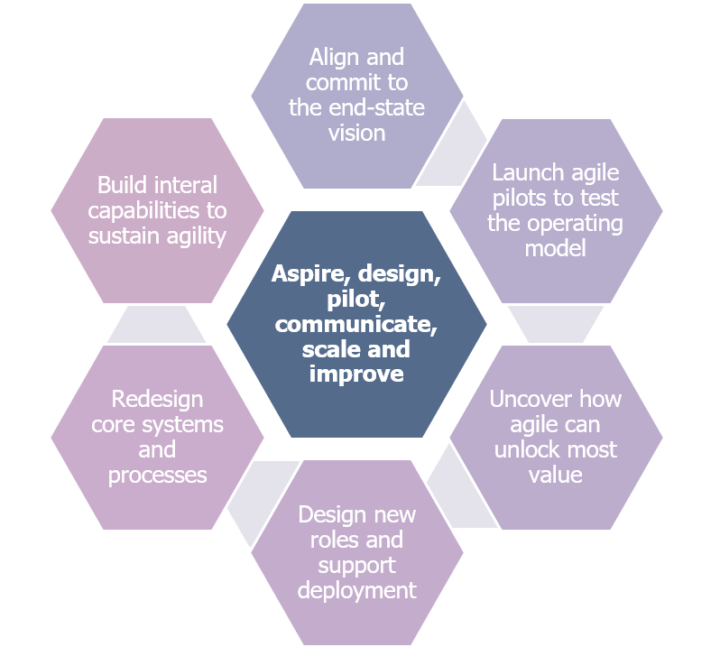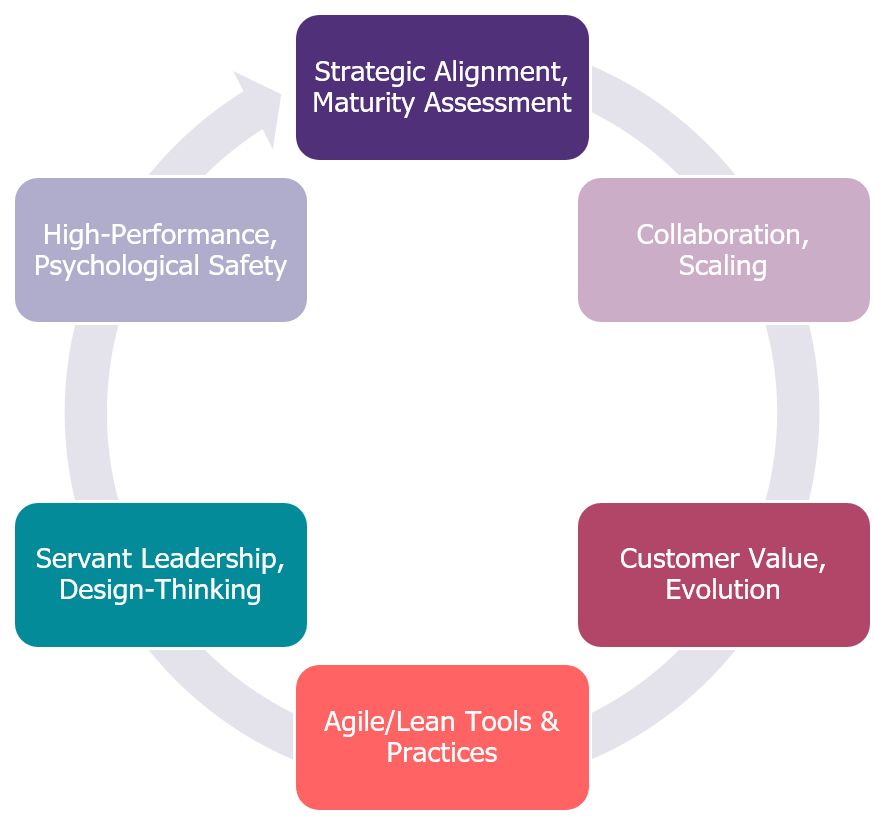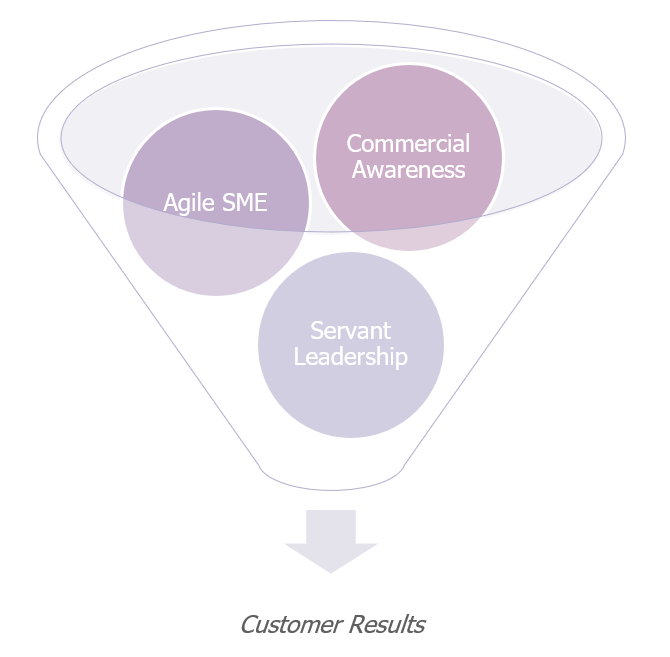As companies emerge from this pandemic, cost-reduction programmes, operating model transformation, digital workplace initiatives, and remote on-boarding of new employees are of the highest priority.
Companies need to create flexibility and adapt organisational systems to support the unknown, in order to change and accelerate accordingly.
Agile Coaches are vital players in enabling this change, as developing Communities of Practice (aligned to SAFe) allows organised groups of agile and business change practitioners to share expertise and experience to help solve business and digital transformation problems.
Post pandemic, many companies are planning to intensify their efforts to adopt a truly scalable, agile operating model to strengthen operational excellence. At a team and programme level adoption challenges are less prevalent, but when trying to scale across the entire business, adopting agile practices becomes more challenging.
Scaling agile is not as simple as replicating agile ceremonies and practices across an increasing number of teams/departments. Hence, companies who try to adapt project management offices (PMOs) by simply deploying tools (JIRA/Confluence) or recruiting more Scrum Masters are not likely to realise intended value.
Agile Coach or a Scrum Master?
An Agile Coach is better suited than a Scrum Master for complex ecosystems for the following reasons:
Scrum Masters are better suited for concentrated agile efforts where team performance is the focus. However, when teams form part of a larger, more complex ecosystem, employing an Agile Coach is more appropriate.
Evolving Organisational DNA
Agile at scale challenges elicit and explicit knowledge of organisational processes (e.g. finance, procurement, recruitment, performance). For example, when implementing an enterprise-wide agile operating model annual performance, reviews don’t have to be completed by the respective line manager.
Recommended Approach to Mature Enterprise Agility:
“Obtaining senior management buy-in upfront, proving the co-created enterprise agile blueprint via pilots, and adjusting from experience is key to success.”
In addition to sourcing Agile Coaches to increase adoption, companies need to build the right capabilities in order to sustain enterprise agility. This involves redesigning core processes and systems to assure operational sustainability and defining an enterprise-wide implementation road map.
What makes an Effective Agile Coach?
Agile Coaches are effective change agents who support business leaders to adopt new ways of working.
This shift in operating model and mindset involves implementing agile ceremonies which are customer centric, results-oriented, and achieve sustainable value.
An effective Agile Coach follows these principles:
- Align with corporate strategy, assess maturity and implement recommendations to strengthen agile practices
- Collaborate across departments and functions to prioritise initiatives, manage dependencies, and support efforts to scale
- Focus on increasing customer value by evolving the enterprise operating model
- Resolve enterprise challenges by leveraging agile/lean tools and practices
- Coach key traits like servant leadership and design-thinking to unlock potential
- Generate and sustain a high-performance culture ensuring people feel valued
Agile Coach Contributions:
There are three key attributes that effective Agile Coaches demonstrate:
1. Commercial Awareness
Effective Agile Coaches possess a strong understanding of the business value chain within their industry. They drive cross-team performance, aligned to corporate strategy within commercial, operational and financial thresholds. They track customer centric performance KPIs (productivity, velocity, satisfaction), then intervene (plan, do, check, act) to improve practice.
2. Agile Subject Matter Expert (SME)
Agile Coaches are decisive and effective in the application of agile frameworks (e.g. Scrum vs. Lean vs. Kanban), and able to lead strategy, planning and innovation ceremonies. They have a core understanding of agile practices, mindsets and values which underpin agile ways of working across enterprise levels. Agile Coaches are effective relationship builders/maintainers across technology, business, and operations to achieve customer results.
3. Servant Leadership Style
Soft skills coupled with the right mindset is key, in order to influence people and their behaviours to achieve timely results. Active listening, self-control, and empathy are critical skills they possess to enable effective interaction, this also enables people involved in change to feel empowered. Strong agile coaches position themselves in the background, allowing the team to receive praise where necessary, whilst influencing and enabling to ensure success.
The 3 Pillars of Sourcing Agile Experts
In order to effectively adopt new ways of Working, Wavestone recommends structuring change across three pillars:
- Assess digital maturity
- Develop transformational business cases
- Develop future operating models across business
- Design and implement digital strategy and technology road maps
- Execute pilots to prove the agile organisational blueprint
- Develop implementation roadmaps and support their execution
- Identify agile weaknesses and suggest corrective efforts
- Coach senior leaders how to adapt and apply agile/lean leadership models
- Optimise costs
- Assure programmes and the realisation of benefits
- Mobilise strategic change initiatives
- Identify and execute recommendations to accelerate change and turnaround off-track programmes and projects
How has the pandemic influenced companies need to scale agile?
The pandemic has accelerated systemic disruption in almost all sectors of the economy meaning organisations have to tackle several strategic challenges at the same time.
In order to manage these challenges, companies should accelerate the transformation of their culture and operating model to become more agile, to innovate faster, build resilience, and increase profitability.
In a practical sense this means adapting business process and enterprise architecture for changed operating environments; leveraging intellectual property and data to drive competitive advantage; changing perspectives on what matters to staff; and re-thinking the relationship between physical location and business operations.
Last Piece of Advice
Agile Coaches ensure the discipline of an agile way of working by helping to sustain an agile enterprise which is customer-centric and results-oriented. To remain competitive organisations should adopt a growth mindset. Employing Agile SMEs can help transformations succeed, structure a tailored approach, and motivate cross-team efforts.
Daniel May
Senior Consultant
Agile Coaches are effective change agents who support business leaders to adopt new ways of working so play a vital role in company wide transformation. Obtaining senior management buy-in upfront, proving the co-created enterprise agile blueprint via pilots, and adjusting from experience is key to success.







